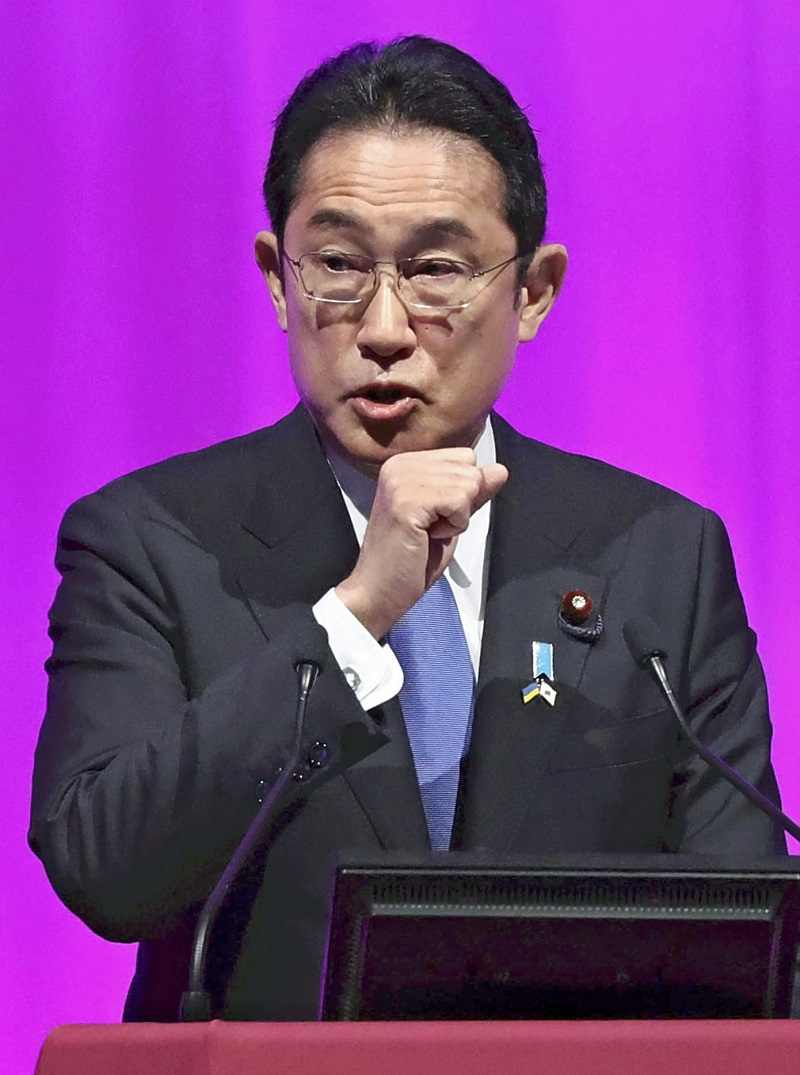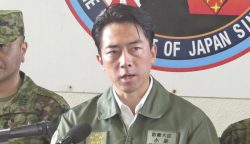
Prime Minister Fumio Kishida delivers a speech at the Liberal Democratic Party’s convention in Tokyo on March 13.
16:16 JST, April 3, 2022
Prime Minister Fumio Kishida has shown a strong interest in pursuing reform of the United Nations in the wake of the dysfunction in the U.N. Security Council over Russia’s invasion of Ukraine.
A draft resolution in the Security Council condemning the invasion was rejected by Russia’s veto. In response, the United States and others called for an emergency session of the U.N. General Assembly with the participation of all member states, and a resolution condemning Russia’s actions was adopted by a majority vote.
In the U.N. Charter, the Security Council has “primary responsibility for the maintenance of international peace and security.” It consists of 15 members: the five veto-wielding permanent member states — Britain, China, France, Russia and the United States — and 10 nonpermanent member states elected to serve two-year terms. A Security Council decision passes with the support of at least nine member countries, unless any of the five permanent members vetoes it.
Kishida was the foreign minister when he was involved in the long-standing issue of the reforms and intends to use that experience to communicate to others an initiative led by Japan.
However, there are considerable difficulties in achieving the reforms, namely concerns over the expansion of the Security Council and limiting the veto power of the permanent members.
“The aggression of permanent member Russia shows the need for a new framework for international order,” Kishida said at the Liberal Democratic Party’s convention in Tokyo on March 13. “Japan has long called for reform of the United Nations. Under my administration, we will do our utmost to realize this goal.”
Japan has served as a nonpermanent member of the council 11 times, tied with Brazil for the most terms. Japan is running in the election in June to be on the council for the next term.
Japan expressed its desire to become a permanent member of the Security Council in 1994. In 2004, Japan, Brazil, Germany and India formed the so-called G4 within the United Nations to jointly seek U.N. reform so that they could become permanent members.
In 2016, when Kishida was foreign minister, he established a strategic headquarters within the Foreign Ministry to strengthen preparations to promote the reform.
“The prime minister has a strong desire for reform,” said a source close to Kishida.
Realization of the G4 proposal would require amending the U.N. Charter, which is highly unlikely.
Amending the charter requires the approval of two thirds of the member states (meaning 129 members) and ratification by at least two thirds of the member states, including all permanent member states. If one of the permanent member states does not ratify it, the amendment fails.
For this reason, the Japanese government is also considering ways of reforming the United Nations without needing to amend the charter. The government has in mind a proposal raised in 2015 by permanent member France that the five permanent members should voluntarily curb their use of the veto in such cases as genocide. Japan was among the 105 countries and regions that supported the proposal.
Kishida touched on this proposal at a meeting of the budget committee of the House of Councillors on March 14.
“We would like to continue our reform efforts in cooperation with France and other nations that are open to reform,” Kishida said.
However, the four other permanent members effectively are against the proposal and there is no prospect that the Japanese government will be able to persuade them otherwise.
Some within the LDP have been cynical about the initiative, given the history of U.N. reform, which has been fraught with difficulties.
“It seems like he is just trying to promote his reform stance,” an LDP lawmaker said, “while being aware of the fact that it isn’t possible.”
Failure in 2005
The most significant opportunity for U.N. reform in recent years came in 2005 on the 60th anniversary of the founding of the United Nations. The G4 submitted a draft resolution proposing the expansion of the number of permanent members of the council from five to 11 and the number of nonpermanent members from 10 to 14, and ensuring that the new permanent members would not exercise their veto power for a period of 15 years.
In the end, the group had to abandon the idea of having a vote on the draft after failing to secure support from the African Union, one of the largest groupings in the United Nations.
Top Articles in Politics
-

Japan PM Takaichi’s Cabinet Resigns en Masse
-

Sanae Takaichi Elected 105th Prime Minister of Japan; Keeps All Cabinet Appointees from Previous Term
-

Japan’s Govt to Submit Road Map for Growth Strategy in March, PM Takaichi to Announce in Upcoming Policy Speech
-

LDP Wins Historic Landslide Victory
-

LDP Wins Landslide Victory, Secures Single-party Majority; Ruling Coalition with JIP Poised to Secure Over 300 seats (UPDATE 1)
JN ACCESS RANKING
-

Japan PM Takaichi’s Cabinet Resigns en Masse
-

Japan Institute to Use Domestic Commercial Optical Lattice Clock to Set Japan Standard Time
-

Israeli Ambassador to Japan Speaks about Japan’s Role in the Reconstruction of Gaza
-

Man Infected with Measles Reportedly Dined at Restaurant in Tokyo Station
-

Man Infected with Measles May Have Come in Contact with Many People in Tokyo, Went to Store, Restaurant Around When Symptoms Emerged





















